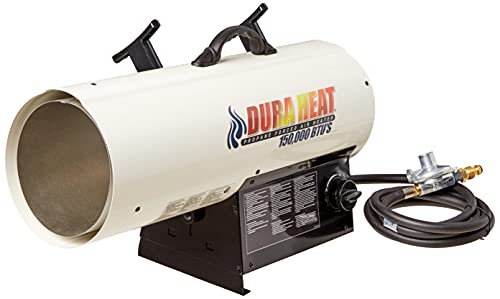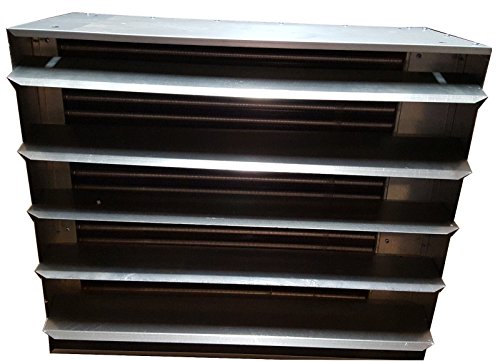Choosing the right high-output heater for a large garage or workshop requires matching fuel type, mounting style, and safety features to your space. Below is a quick comparison of five relevant heaters near the 150,000 BTU capacity so you can scan options before reading detailed product sections.
| Product | Type | Fuel | BTU Range | Key Feature |
|---|---|---|---|---|
| Dura Heat – GFA150A Propane Forced Air Heater | Forced-Air Unit | Propane (LP) | 120,000–150,000 | Variable Output, 14–18 hr on 100 lb cylinder |
| 150,000 BTU Hot Water Hanging Heater (American Royal) | Hydronic Hanging Unit | Hot Water (Hydronic) | 150,000 | 2-speed fan for hydronic systems |
| 150,000 BTU Hot Water Hanging Heater w/ Remote (American Royal) | Hydronic Hanging Unit | Hot Water (Hydronic) | 150,000 | Includes remote thermostat & on/off/on switch |
| Mr. Heater MH170QFAVT Portable Propane Forced Air | Portable Forced-Air | Propane | 125,000–170,000 | Quiet burner technology, high output |
| Mr. Heater Big Maxx MHU80NG Natural Gas Unit Heater | Natural Gas Unit Heater | Natural Gas | 80,000 | Powered exhaust venting, wall/ceiling mount |
Content Navigation
- Dura Heat – GFA150A Propane Forced Air Heater, 120,000-150,000 BTU
- 150,000 BTU Hot Water Hanging Heater / 150K BTU Garage Unit Heater
- 150,000 BTU Hot Water Hanging Heater – Remote Thermostat Version
- Mr. Heater MH170QFAVT 170,000 BTU Portable Propane Forced Air Heater
- Mr. Heater F260560 Big Maxx MHU80NG Natural Gas Unit Heater, 80,000 BTU
- Buying Guide: Choosing The Right High-BTU Garage Heater
- 1. BTU Needs And Sizing
- 2. Fuel Type: Propane, Natural Gas, Or Hydronic
- 3. Heater Style And Installation
- 4. Safety Features
- 5. Controls And Zone Management
- 6. Noise And Workspace Impact
- 7. Efficiency And Operating Cost
- 8. Installation And Venting Requirements
- 9. Maintenance And Serviceability
- 10. Multiple Perspectives For Comparison
Dura Heat – GFA150A Propane Forced Air Heater, 120,000-150,000 BTU

This unit is a propane (LP) forced-air heater with a variable rated output between 120,000 and 150,000 BTU. It is intended for large, ventilated areas such as garages and workshops where portable or semi-permanent forced air is acceptable.
- Variable Output: 120,000–150,000 BTU helps match heat to space and conditions.
- Runtime: Operates roughly 14–18 hours on a 100 lb propane cylinder at rated settings.
- Fan-Forced Hot Air: Rapid warm-up capability ideal for spaces that need quick temperature rise.
- Fuel Type: Propane only—no natural gas connection.
Applications include detached garages, workshops, and temporary job-site heating where propane supply and ventilation are manageable. The forced-air design disperses heat quickly but requires appropriate clearance and exhaust planning if used indoors.
150,000 BTU Hot Water Hanging Heater / 150K BTU Garage Unit Heater

This hydronic hot water hanging unit heater provides a fixed 150,000 BTU capacity and is designed to integrate with a hot water boiler or wood boiler system. It’s a hanging unit with a 2-speed fan for airflow control.
Call 888-896-7031 for Free Local HVAC Quotes – Compare and Save Today!
- Hydronic Input: Uses hot water from an external boiler—no direct combustion in the unit.
- 2-Speed Fan: Adjustable airflow to tailor distribution and noise.
- Mounting Style: Ceiling or wall-mounted hanging design suited for garages with available hydronic supply.
- Compatibility: Often used with wood boilers or central boiler systems.
Hydronic heaters are efficient when you already have a boiler system. They avoid on-site combustion emissions and often produce even, sustained heat, though they require piping, pumps, and a boiler to supply hot water.
150,000 BTU Hot Water Hanging Heater – Remote Thermostat Version

This version of the American Royal hydronic heater includes a remote thermostat and an on/off/on switch for improved control. It keeps the 150,000 BTU hydronic capacity and the 2-speed fan of the base hanging unit.
- Remote Thermostat: Enables remote temperature control and scheduling for more precise comfort.
- 2-Speed Fan & Switch: Off/low/high control for adjusting airflow and noise levels.
- Hydronic Integration: Requires a hot water source (wood boiler or central boiler).
- Installation: Ceiling-hung installations require structural support and piping connections.
This model is suited to users who want the hydronic approach with added convenience of a remote thermostat. The controls can reduce energy use by matching run time to needs.
Mr. Heater MH170QFAVT 170,000 BTU Portable Propane Forced Air Heater

The Mr. Heater MH170QFAVT is a high-output portable propane forced-air heater rated for 125,000–170,000 BTU depending on settings. It’s targeted at large job sites, outdoor events, and large garages where portability and high output are priorities.
Call 888-896-7031 for Free Local HVAC Quotes – Compare and Save Today!
- High-Output Performance: Up to 170,000 BTU suitable for very large or poorly insulated spaces.
- Quiet Burner Technology: Designed to operate quieter than standard propane heaters—useful for workshops where noise matters.
- Safety Features: High-temperature limit switch and thermoelectric safety valves provide protection against overheating and unsafe conditions.
- Portability: Rugged build and handle for moving around job sites or garages.
As a forced-air propane heater, it provides rapid heating and broad coverage, but requires ventilation and careful fuel management. It’s appropriate when you need the highest practical output with the flexibility of moving the unit.
Mr. Heater F260560 Big Maxx MHU80NG Natural Gas Unit Heater, 80,000 BTU

This Mr. Heater Big Maxx model is an 80,000 BTU natural gas unit heater designed for permanent mounting. While lower than 150,000 BTU, it represents a common unit-heater style for garages that can be combined or used where extremely high output is not required.
- Natural Gas: Designed for natural gas; conversion kit available for LP when supplied.
- Powered Exhaust: Allows vertical or horizontal venting options for flexible installation.
- Thermostat Access: External access to thermostat and A/C terminals simplifies control integration.
- Mounting: Includes angle brackets for ceiling or wall mounting; intended as a fixed heating solution.
For garages with natural gas service and moderate heating needs, an 80,000 BTU unit heater can offer efficient, continuous heat. Multiple units or higher-capacity models may be necessary for larger spaces or very cold climates.
Buying Guide: Choosing The Right High-BTU Garage Heater
Selecting the best heater for a large garage involves comparing multiple factors beyond raw BTU. This guide outlines the key considerations to help you match heater type to space and usage.
1. BTU Needs And Sizing
Calculate Heating Load: BTU requirements depend on garage size (volume), insulation, ceiling height, climate, and desired temperature rise. Use cubic feet and insulation levels rather than a single BTU-per-square-foot rule for accuracy.
Oversizing vs. Multiple Units: A single very-high-BTU forced-air heater provides rapid warming but may create uneven temperatures. Multiple smaller unit heaters or hydronic panels can distribute heat more evenly in large open shops.
2. Fuel Type: Propane, Natural Gas, Or Hydronic
- Propane (LP): Portable, high-output options like the Dura Heat and Mr. Heater models. Requires propane supply and ventilation planning.
- Natural Gas: Ideal for fixed installations with a gas line. Lower operating attention and continuous supply where available.
- Hydronic (Hot Water): Integrates with boilers for efficient, low-emission heat distribution. Requires boiler, piping, and pump systems but offers steady, quiet heat and no on-site combustion.
3. Heater Style And Installation
- Forced Air (Portable Or Mounted): Quick warm-up, good for intermittent use. Requires ventilation, clearance, and often open areas for safe exhaust.
- Unit Heaters (Natural Gas/Electric): Permanently mounted, designed for continuous operation and directed airflow. Often easier to control with wall thermostats.
- Hydronic Hanging Units: Best when you already have a boiler; minimal combustion in the workspace and even heating distribution.
4. Safety Features
Look for high-temperature limit switches, thermoelectric safety valves, tip-over/power cutoffs (for portable models), and proper venting options. Forced-air combustion heaters require attention to CO and combustion air—use CO detectors when combustion-based heaters operate indoors.
5. Controls And Zone Management
Thermostats, remote controls, and multi-speed fans allow better temperature control and energy savings. Hydronic units with remote thermostat options can maintain steady temperatures with lower cycling.
6. Noise And Workspace Impact
Forced-air combustion heaters produce noise and airflow that may affect shop activities. Models with quiet burner technology reduce disruption. Hydronic systems and some unit heaters generally run quieter.
7. Efficiency And Operating Cost
Operating cost depends on fuel price and heater efficiency. Hydronic systems paired with efficient boilers can be economical long-term. Natural gas fixed units often have lower fuel cost than propane, but availability varies.
8. Installation And Venting Requirements
- Propane Forced-Air: May need fresh air supply and safe location; open-air or well-ventilated garages typically required.
- Natural Gas Unit Heaters: Require venting clearances and proper professional gas connection.
- Hydronic Units: Require plumbing connections, pumps, and boiler integration—usually installed by HVAC/plumbing pros.
9. Maintenance And Serviceability
Check accessibility for filter replacement, burner access, and controls. Hydronic units need occasional coil or heat exchanger checks; combustion units require periodic inspection of burners, regulators, and gas lines.
10. Multiple Perspectives For Comparison
- Performance Perspective: Compare BTU range, airflow, and coverage area—higher BTU and stronger fans heat larger volumes faster.
- Practical Perspective: Consider fuel logistics (tank refills, gas line), installation complexity, and portability needs.
- Safety Perspective: Evaluate built-in shutdowns, required clearances, and whether indoor combustion is acceptable for your use case.
- Cost Perspective: Factor initial installation complexity, energy cost per fuel type, and expected maintenance.
Using these factors will help you choose between a high-output forced-air propane heater for rapid, portable heating; a natural gas unit heater for permanent installations; or a hydronic 150,000 BTU hanging unit for steady, low-emission heating when a boiler is available.
Tips for Getting the Best HVAC Prices
- Prioritize Quality Over Cost
The most critical factor in any HVAC project is the quality of the installation. Don’t compromise on contractor expertise just to save money. - Check for Rebates
Always research current rebates and incentives — they can significantly reduce your overall cost. - Compare Multiple Quotes
Request at least three estimates before making your choice. You can click here to get three free quotes from local professionals. These quotes include available rebates and tax credits and automatically exclude unqualified contractors. - Negotiate Smartly
Once you've chosen a contractor, use the proven strategies from our guide — How Homeowners Can Negotiate with HVAC Dealers — to get the best possible final price.
